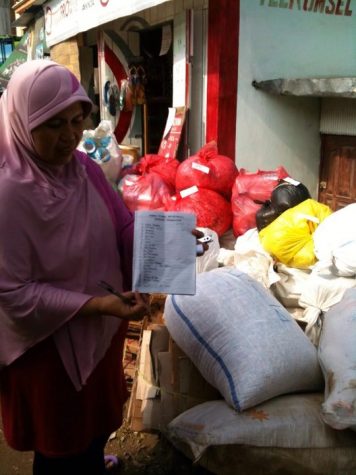Indonesia’s trash banks help the people and the environment
Trash is collected and separated to deposit at the bank in Indonesia.
December 17, 2017
A trash bank, contrary to the first impression that might come to mind, has nothing to do with one’s personal financial institution.
Still, a trash bank will allow individuals to grow a “savings” account and keep money for future references by recycling trash.
This concept is helping the poorest individuals in one country.
Indonesia’s trash bank on Jogjakarta, Bantul Indonesia is a good way to help the people who need it the most-earn credit and savings with their trash collection.
According to a Bloomberg report the trash collection system allows many (mostly women) a means to help support their families by storing credit from collecting trash for recycling.

Women keeping record of the trash deposited by people in Indonesia.
Trash banking has spread to Africa and Asia, and is at least one way to reduce the pressure on the landfill sites that are growing.
The concept of trash bank is very simple. Residents who are interested in the trash bank program collect recyclable trash including packages, paper and plastic bottles to the bank where the trash is weighed and then monetary value is assigned to the person.
Desfa Yusmaliana, a member of the Community College Initiative Program from Indonesia spoke to North East Valley News about the importance of trash banks in Indonesia.
“I believe trash bank program is a great source to conserve the environment because a small activity like this can bring big change to the environment,” Yusmaliana said.
A trash bank is like other banks where people can open an account but the deposits are trash collected which in return is given cash value with the ability to withdraw money when needed.
The commitment to buy the trash is made by the government that in turn buys it at a fixed price and then sells it to the merchants of waste that ship it off to the paper and plastic mills separately in different places.
Stefanus Rafael, who is known as the “plastic man” in Komodo Indonesia is an International Student participant at Scottsdale Community College. Rafael believes the positive impact of trash banking on the future with regard to the environment, cannot overstated.
“Trash Bank system has reduced the numbers of waste to the dumping area or to the sea. This way it is easy to change the mind set of people in terms of cleaning up the environment,” Rafael said.



Iroro • Nov 19, 2018 at 12:19 pm
nice and innovative,
wouldn’t mind practical steps on how to replicate same in my country.
Thanks.